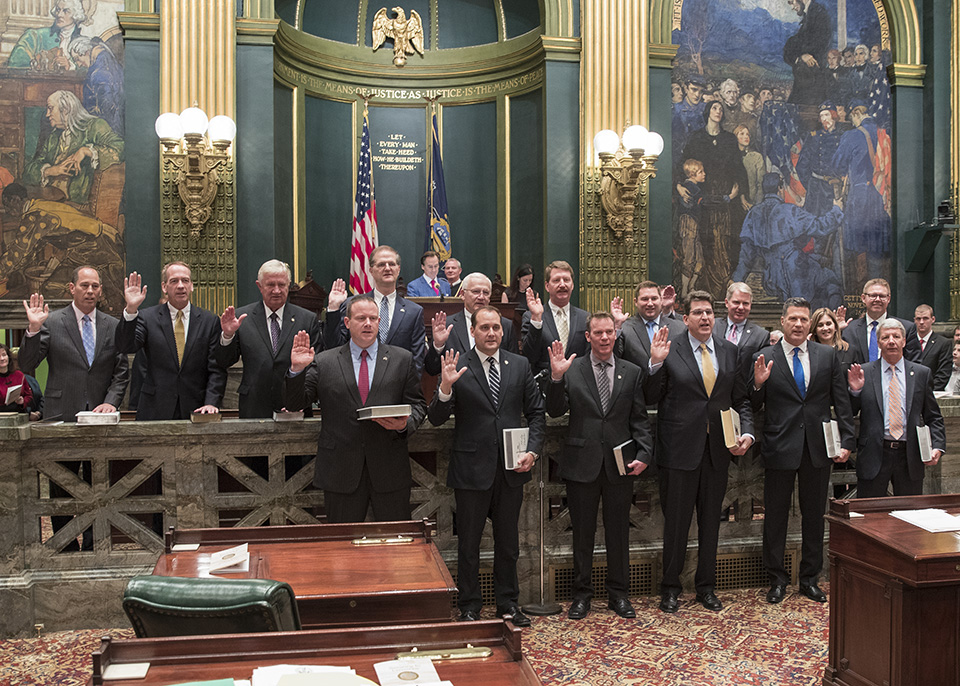Welcome to This Week in Civil Rights and Civil Liberties.
This week, Pennsylvania Republicans resist the state Supreme Court’s order to redraw district maps, labor advocates organize in preparation for oral arguments in Janus vs. AFSCME, and data-driven remedies to bias in the criminal justice system face scrutiny.
Immigration
Mentors Under Siege: California’s DACA Teachers: “Of California’s roughly 223,000 DACA recipients, an estimated 5,000 are working teachers, according to the Migration Policy Institute, a Washington think tank.” (Capital & Main)
Criminal System
Cory Booker Wants DOJ to Probe Discrimination in Setting of Prison Sentences. In 2014 the Department of Justice requested a report on the potential for bias to surface in algorithmic risk assessment tools for anything from setting bail to prison terms, but the U.S. Sentencing Commission has yet to deliver. (Observer)
Big data may be reinforcing racial bias in the criminal justice system. Data-driven tools are often touted to remove human bias from the system, but any data that could show this is scant and often inaccessible. (The Washington Post)
Privacy
Photo Algorithms ID White Men Fine—Black Women, Not So Much. Studies have found that IBM and Microsoft’s Facial-analysis services are less accurate for people with dark skin, leading to concerns of bias as the technology sees broad use, including by the FBI. (Wired)
Why cops won’t need a warrant to pull the data off your autonomous car. Law enforcement could have unprecedented access to personal information as autonomous cars continue to become more common and interconnected. (Ars Technica)
Labor and Economic Justice
What Amazon Does to Poor Cities. Amazon often builds its warehouses in low-income neighborhoods– imposing overwhelming working conditions and offering low pay in return for desperately-needed jobs. (The Atlantic)
Teamsters withdraw demands banning UPS use of drones, autonomous vehicles. The unexpected move comes after UPS began shifting its delivery methods away from UPS Teamsters and towards new employees making deliveries using their personal vehicles. (DC Velocity)
What Can Uber Teach Us About the Gender Pay Gap? Contrary to hopes that the gig economy would help eliminate the gender pay gap through its flexibility, male Uber drivers still make more money than female drivers, possibly pointing to the impact of societal norms and obligations in general. (Freakonomics)
Minimum wage protesters hit streets of Detroit, demand $15/hour and civil rights. Fast food workers in Detroit and across America walked out of their jobs today, joining activists from groups like the Poor People’s Campaign to demonstrate in support of a living wage. (Detroit Free Press)
Thousands to rally in ‘Working People’s Day of Action’ before Supreme Court clash over unions. Workers’ rights organizations and an array of groups concerned with social justice will be mobilizing rallies in support of organized labor on Feb. 24, two days before the Supreme court hears Janus vs. AFSCME and 50 years after the 1968 sanitation workers’ strike in Memphis. (NY Daily News)
Medicaid Work Requirements Will Reduce Low-Income Families’ Access to Care and Worsen Health Outcomes. These coverage losses will also likely make it more difficult for many people to find or keep a job, according to a new report from the Center on Budget and Policy Priorities.
LGBTQ Equality
New tool helps LGBT community parse local non-discrimination housing laws. Real estate site Trulia introduced a tool that lists the protections available to LGBT people at the city, county, or state level for a given property, and they hope to expand this tool to other protected groups in the future. (Curbed)
Civil Rights and Gender Equality
#MeToo will have staying power, Ruth Bader Ginsburg insists. “Justice Ruth Bader Ginsburg believes the “#MeToo” movement will have “staying power,” and she doesn’t worry about a serious backlash.” (CNN)
Harvey Weinstein, His Brother And Their Company Hit With Civil Rights Lawsuit. “As alleged in our complaint, The Weinstein Company repeatedly broke New York law by failing to protect its employees from pervasive sexual harassment, intimidation, and discrimination,” New York’s attorney general Eric Schneiderman said in a statement. (NPR)
Civil rights director argues proposed employment legislation could burden employers. The Wisconsin legislature’s bills would prohibit the city of Madison from enforcing its existing equal opportunities ordinance as it relates to employment, according to the city’s Civil Rights Director. (The Cap Times)
The trauma trap: what’s causing inequalities in emergency care? “Compared to white patients with injuries of similar severity, black and Hispanic patients were found to have 20% and 50% greater likelihoods of death respectively.” (The Guardian)
Net Neutrality
ISPs must follow net neutrality in New Jersey, governor declares. A new executive order prohibits ISPs from blocking or throttling traffic if they sell broadband to state agencies. But will it survive a preemption challenge? (Ars Technica)
Voting Rights
Ohio Lawmakers Actually Reach A Bipartisan Deal To Try To Stop Gerrymandering. Ohio lawmakers reached a bipartisan deal to reform their redistricting process, such as by requiring support from members of the minority party and reducing the map’s lifespan from ten years to four. (The Huffington Post)
Judiciary
‘We’d Like to See America Right of Center.’ Mitch McConnell Explains His Strategy on Judges. “The impact that this Administration could have on the courts is the most long-lasting impact we could have,” McConnell said. (Time)
Republicans are using long-forbidden tactics to chip away at judicial independence. “Pennsylvania Republicans enjoy a two-thirds supermajority in the state senate, enough to remove a justice. If the state supreme court holds defiant GOP leaders in contempt, Republicans can retaliate with impeachment.” (ThinkProgress)

